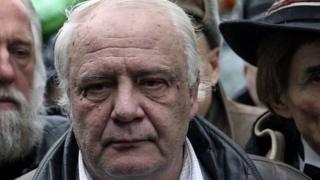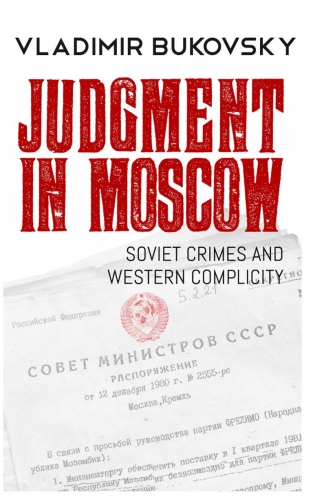dimanche, 22 décembre 2019
RIP: Vladimir Bukovsky, the Defiant

RIP: Vladimir Bukovsky, the Defiant
One of the first things famous Soviet dissident Vladimir Bukovsky (1942–2019) told me about himself was that his roots were Polish. After the crushing of the Kościuszko Insurrection of 1794, his ancestor, Pan Bukowski, was taken prisoner by the Muscovites and shipped off to Siberia. This was a harsh introduction to Russian living for the family. Vladimir would continue into the footsteps of his forefathers.
Vladimir was born in the matrix of the Soviet Union, but as a teenager, he self-liberated. At 14, he heard about communist leader Nikita Khrushchev's secret speech blaming Stalin for slaughtering millions. Soon after, he rooted for the Hungarian freedom fighters in 1956. He started asking questions. He challenged the system. Upon his first arrest in 1959, the youngster refused to become a snitch for the Soviet secret police. And the KGB judged him, partly with rigid annoyance and partly with grudging admiration, unfit for recruitment.
In 1963, Vladimir was arrested, tried, and sentenced to two years for anti-Soviet agitation. They locked him up in a psychiatric ward (psikhushka), where he was "diagnosed" with "symptomless schizophrenia." According to Soviet "science," anyone opposing communism had to be a schizophrenic, even when he did not display any symptoms. He was medicated forcibly. Bukovsky told me that the trick was to learn how to regurgitate the psychotropic drugs so the hospital wardens and nurses would not notice.
After getting out in 1965, the intrepid dissident plunged right back into anti-communist activities. He co-organized a demonstration and a petition drive in solidarity with other Soviet dissidents. For this he was rearrested and thrown back into the red looney bin. Now things turned tougher. The KGB wanted to turn their prisoner into a vegetable. Forcible administration of drugs and their doses increased. Luckily, the regurgitation trick continued to serve the dissident. Vladimir endured half a year of this but was unexpectedly released after half a year in mid-1966.
Six months later, Bukovsky joined a demonstration in defense of other nonviolent protesters who were on trial or under lock and key, only to be seized himself and tried for violating a ban on public protest. In his defense, he invoked Soviet law, which Soviet judges and secret policemen were apparently violating. Because Vladimir refused to express remorse for demonstrating, he was sent to the Gulag — a penal colony with a forced labor regime in Bor in the Voronezh region. His sentence was three years. He got out in 1970.
Drawing on his experiences in the Gulag and, in particular, in psychiatric wards, the dissident began compiling a record of the Soviet abuse of psychiatry. To add insult to injury, he discovered that some of the communist psychiatrists who worked hand in glove with the KGB were treated cordially in the West and even invited to scholarly conferences at some of the leading institutions. The work of the medical monsters who facilitated the torture of political prisoners was treated seriously by some in the West. Bukovsky resolved to expose it. He managed to get his report smuggled out to the West.
Consequently, a veritable storm broke out among French, British, and other psychiatrists, some of whom demanded transparency from their Soviet colleagues and believed the dissident accounts of abuse. For this Vladimir found himself under pre-trial detention in isolation and almost a year later received a sentence of 12 years for "slandering Soviet science." While serving his sentence, he secretly co-authored a manual on how to beat the Soviet system of interrogation to avoid being accused of insanity. The manual eventually found its way to the West, where it was widely disseminated.
Bukovsky became a cause célèbre. The KGB was livid. In 1976, at the height of détente, the Kremlin decided to further burnish its "liberal" credentials. Thus, Moscow agreed to swap the perky freedom-fighter for the head of the communist party of Chile, Luis Corvalán, who was incarcerated following a successful military coup to thwart a red revolution in that country. Compliments of General Augusto Pinochet, Vladimir was thrown out of the USSR and landed in the West.
He settled in England, where he successfully pursued a degree in biology at Cambridge University, where he settled permanently. Further, he trained as a neuropsychologist and continued his career as a writer and a human rights campaigner. He published prodigiously. Vladimir exposed communist crimes globally as well as Western naïveté regarding the Soviet Union. He joined numerous initiatives championing freedom. Among others, Bukovsky animated the American Foundation for Resistance International, which aspired to coordinate all anti-communist activities by the captive people in all countries afflicted by Marxism-Leninism. At the height of Gorbymania in the West, Vladimir and his associates dared to question the sincerity of secretary general of the Communist Party of the USSR Mikhail Gorbachev. They pointed out quite correctly that the Soviet leader wanted to save communism, not to destroy it.
In 1992, at the invitation of Russia's president, Boris Yeltsin, Bukovsky returned to Moscow. The Kremlin solicited his assistance in putting together evidence for the public trial of the Communist Party for its crimes. Yeltsin eventually scrapped the idea, but not before Bukovsky was able to copy over a million pages of secret documents from Stalin's archives. While Vladimir scanned away right in front of their noses, the KGB guardians of the documentary treasure trove had no idea what either a scanner or a laptop was, so, while watching him curiously, they never interrupted him. Later, to his own great surprise, the former dissident was permitted to fly out of Moscow undisturbed with his computer full of archival goodies.

In 1995, Bukovsky's magnum opus, Judgment in Moscow, emerged from this research trip. Published in several languages, sadly, it had to wait nearly 25 years for an English translation and publication. Because we failed to smash communism after it tripped, he warned us about the resurgence of post-communism and its threat of metastasizing in the West in the form of political correctness and socialist étatism. Vladimir further cautioned everyone about the European integration and its totalitarian potential. He was always full of unorthodox ideas. Arguably the most shocking to us was his opinion about the Muscovite state and its successors. Bukovsky told Dr. Sommer explicitly: "It is not my fault that I was born in the Soviet Union. Why should I harbor any sentiment to that entity? And Russia was a logical way to the USSR, even if many fabulous people lived there. ... Therefore, as long as Russia does not fall apart into several entities, it will remain dangerous. A divided Russia is in the interest of the world, just as a united central Europe is in the interest of the world. ... This is not a question of nationalism and resentment, but of physics and balance. Big and demoralized Russia will always harm her smaller neighbors. Only its dividing and balancing can eliminate the danger, although not completely because Russia is a universe of slavery."
At the end, Vladimir had the last laugh: he was buried a hundred yards away from the grave of Karl Marx at Highgate Cemetery in London. Non-conformist, defiant, and free, Vladimir Bukovsky, RIP.

00:10 Publié dans Hommages, Littérature | Lien permanent | Commentaires (0) | Tags : dissidence soviétique, urss, union soviétique, vladimir boukovski, lettres, lettres russes, littérature, littérature russe, russie, communisme |  |
|  del.icio.us |
del.icio.us |  |
|  Digg |
Digg | ![]() Facebook
Facebook


